
- •Family tree
- •HIGHER EDUCATION IN ENGLAND
- •Present Progressive Tense with the Future Meaning
- •Be going to
- •be going to
- •Present Simple Tense with the Future Meaning
- •5.15. Complete the following sentences with the contracted form, as in the model.
- •5.19. Complete the following sentences, as in the model.
- •If you study hard, you will pass your exams.
- •5.21. Complete the following sentences with the correct form of the verb in brackets.
- •INTRODUCTION TO THE WWW AND THE INTERNET
- •WAP PHONE
- •Table 9.4
- •Simple Active
- •Simple Active
- •Participle II
- •Functions
- •11.7. Choose the correct answer to the following questions.
- •Forms
- •Function
- •Object
- •Attribute
- •Adverbial modifier
- •Simple Active
- •Table 12.1
- •Forms
- •Object
- •Attribute
- •Complex Object
- •Complex Subject
- •14.8. Choose the correct answer to the following questions.
- •14.10. Read the text “Jane Addams – a Mother of Social Work” and answer the following questions.
- •Member
- •Example
- •Subject
- •Adverbial modifier
- •Attribute
- •Part of speech
- •Part of speech
- •Example
- •TEXT 9
- •CHALLENGES OF LEADERSHIP IN TEAMS
- •Личные местоимения
- •Оборот there + to be
- •Настоящее совершенное и прошедшее простое времена
- •Настоящее продолженное время в значении будущего
- •Конструкция be going to
- •(Be going to)
- •Настоящее простое время в значении будущего
- •Прямая и косвенная речь
- •Страдательный залог
- •Функция
- •Определение
- •Обстоятельство
- •Формы герундия
- •(Forms)
- •Подлежащее
- •Дополнение
- •Неперфектный вид,
- •Неперфектный вид,
- •Перфектный вид,
- •Функции инфинитива в предложении
- •Дополнение:
- •Определение:
- •Сравнение функций инфинитива и герундия в предложении
- •В предложении инфинитив часто выполняет те же функции, что и герундий.
- •Часть сказуемого
- •Дополнение
- •Порядок слов в этом обороте такой же, как и абсолютном причастном обороте:
- •Часть речи
- •Пример
- •PARTICIPLE
- •PARTICIPLE
- •Functions
- •Functions
- •Complex Object
- •Конверсия
- •Перенос ударения
- •Словосложение
- •Литература
Министерство образования и науки Российской Федерации Федеральное государственное бюджетное образовательное учреждение высшего профессионального образования «Томский государственный университет систем управления и радиоэлектроники»
Л.Е. Лычковская Е.Р. Менгардт
ENGLISH FOR STUDENTS
OF TECHNICAL SCIENCES
Учебное пособие
Томск
ТУСУР
2015

УДК 811.111(075.8) ББК 81.432.1-923 Л88
Рецензент
Болсуновская Л.М., зав. кафедрой ИЯГН ИГНД ТПУ, канд. филол. наук, доцент, проф. РАЕ
Лычковская Л.Е.
Л88 English for Students of Technical Sciences : учеб. пособие / Л.Е. Лычковская, Е.Р.
Менгардт. - Томск : Томск. гос. ун-т систем упр. и радиоэлектроники, 2015. - 464с. ISBN 978-5-86889-440-4
Учебное пособие составлено в соответствии с программой по английскому языку для технических вузов. Оно предоставляет возможность студентам овладеть главными видами коммуникативной деятельности: говорением, чтением и пониманием, письмом и переводом.
Первый раздел (Part I) содержит обязательные вузовские темы, рекомендуемые к изучению в первом и втором семестрах обучения. В каждый урок включён грамматический блок с правилами в рамках-таблицах и упражнениями. Второй раздел (Part II) содержит адаптированные научно-популярные тексты и упражнения коммуникативного характера. Пояснения к грамматическим таблицам уроков даны в разделе"Grammar Reference". Раздел "Reader" включает тексты, несущие информацию об инновациях в современных коммуникационных технологиях. Пособие содержит дополнительный материал "Additional Exercises", включающий упражнения повышенной сложности для самостоятельной работы, а также приложения ("Appendices"), в которых даны краткие сведения по фонетике
и таблицы основных способов словообразования.
Для студентов вечернего и заочного отделений технических вузов.
УДК 811.111(075.8) ББК 81.432.1-923
|
© Лычковская Л.Е. Менгардт Е.Р., |
|
2015 |
|
©Томский гос. ун-т систем упр. |
ISBN 978-5-86889-440-4 |
и радиоэлектроники, 2015 |
1

Contents
Introduction (От авторов) ............................................................................. |
4 |
||
Part I ............................................................................................................. |
|
|
5 |
Unit |
1. |
About Myself ................................................................................ |
6 |
Unit |
2. |
One Day in My Life .................................................................... |
29 |
Unit 3. |
The Value of Education ............................................................... |
47 |
|
Unit |
4. |
My Future Job ............................................................................. |
63 |
Unit |
5. |
My Home Town .......................................................................... |
82 |
Unit |
6. |
The Russian Federation ............................................................... |
99 |
Unit |
7. |
The United Kingdom................................................................. |
114 |
Unit 8. |
The United States of America .................................................... |
130 |
|
Part II......................................................................................................... |
|
|
153 |
Unit |
9. |
Communications........................................................................ |
154 |
Unit |
10. |
Computers ................................................................................. |
176 |
Unit |
11. |
The Laser Technology Today and Tomorrow ............................ |
192 |
Unit |
12. |
Management.............................................................................. |
211 |
Unit |
13. |
Economics................................................................................. |
229 |
Unit |
14. |
Social Work............................................................................... |
242 |
Unit |
15. |
Ecological Problems of the World ............................................. |
254 |
Reader |
........................................................................................................ |
|
274 |
Text 1. |
The Evolution of Technology – The History of Computers........ |
275 |
|
Text 2. |
What is USB?............................................................................ |
277 |
|
Text 3. |
What is 64-bit Computing?........................................................ |
280 |
|
Text 4. |
Intel® Dual Core Processors...................................................... |
281 |
|
Text 5. |
Smartphone ............................................................................... |
282 |
|
Text 6. |
High-definition Television......................................................... |
283 |
|
Text 7. |
Wi-Fi......................................................................................... |
286 |
|
Text 8. |
Ecology and Human Rights in Russia ........................................ |
293 |
|
Text 9. |
Our Health................................................................................. |
294 |
|
Text 10. Challenges of Leadership in Teams ........................................... |
295 |
||
Grammar Reference .................................................................................. |
297 |
||
Unit |
1. |
Pronouns, the verb to be, the verb to have (got), |
|
|
|
Articles, Plurals, Possessive Case .............................................. |
298 |
Unit |
2. |
Numbers, There + to be, Present Simple Tense, Indefinite |
|
|
|
Pronouns ................................................................................... |
323 |
Unit |
3. |
Present Progressive Tense, Adjectives and Adverbs................... |
332 |
Unit 4. |
Past Simple Tense, Present Perfect Tense, Present Perfect |
|
|
|
|
Progressive Tense...................................................................... |
339 |
Unit |
5. |
Talking about Future ................................................................. |
348 |
Unit 6. |
Passive Voice, Degrees of Comparisons, Relative Pronouns ...... |
353 |
|
2

Unit 7. |
Modal Verbs, Conditionals II .................................................... |
363 |
Unit 8. |
Past Progressive Tense, Past Perfect Tense, Direct |
|
|
and Reported Speech ................................................................. |
370 |
Unit 9. |
Revising Tenses ........................................................................ |
387 |
Unit 10. |
Participle ................................................................................... |
394 |
Unit 11. |
Gerund, Multifunctional Words ................................................. |
402 |
Unit 12. |
Infinitive ................................................................................... |
411 |
Unit 13. |
Subjunctive Mood ..................................................................... |
419 |
Unit 14. |
Modal Verbs.............................................................................. |
423 |
Unit 15. |
Simple and Complex Sentences ................................................. |
429 |
Additional exercises ................................................................................... |
442 |
|
Appendices ................................................................................................. |
456 |
|
3

Introduction (Oт авторов)
Данное учебное пособие предназначено для студентов технических высших учебных заведений и составлено в соответствии с«Программой по иностранным языкам для вузов неязыковых специальностей».
Раздел I (Part I) содержит обязательные вузовские темы, рекомендованные к изучению на первом этапе обучения . В каждом уроке имеется блок грамматики с правилами в рамках-таблицах и упражнениями.
Раздел II (Part II), предназначенный для второго этапа обучения, включает в себя уроки, тематически связанные с профилем технических вузов. Данный раздел содержит адаптированные научно-популярные тексты и упражнения коммуникативного характера. Как и в первом разделе, имеется блок грамматики. После каждого правила даются упражнения на закрепление материала, которые по своему содержанию имеют общенаучный характер и будут понятны слушателям любой специальности. Эти упражнения рекомендуется делать в аудитории под контролем преподавателя после введения нового материала.
Пояснения к грамматическим таблицам уроков разделов I и II даны в разделе “Grammar Reference”. Авторы считают наличие этого раздела оправданным, поскольку данное учебное пособие предназначено для студентов вечерней и заочной форм обучения.
Раздел “Reader” – тексты, несущие информацию об инновациях в современных коммуникационных технологиях, рекомендован для индивидуального перевода.
В разделе “Additional Exercises” содержатся упражнения повышенной сложности для самостоятельной работы.
И, наконец, приложения (“Appendices”) включают в себя краткие сведения по фонетике и таблицы основных способов словообразования.
Условные обозначения:
– тексты и диалоги для чтения
– устные упражнения
– письменные упражнения
– грамматические правила
Л.Е. Лычковская, Е.Р. Менгардт
4

PART I
5

Unit 1. ABOUT MYSELF
1.1.Read the following words and expressions and pay attention to the examples.
to introduce |
Let me introduce my friend to you. |
представлять, знакомить |
|
for short |
We called him Dick for short. |
для краткости; сокращённо |
|
to be born |
Shakespeare was born in the 16th |
родиться |
century. |
an appearance |
The appearance is very important for |
внешность |
actresses. |
to be good (bad) at smth. |
My brother is very good at physics but |
преуспевать (не преуспевать) |
he is bad at English. |
в чем-л. |
|
to be married to smb. |
Kate is married to a businessman. |
быть женатым на ком-л., |
|
быть замужем за кем-л. |
|
quite |
Nick is quite tall and intelligent. |
довольно |
|
character |
By character my boyfriend is very |
характер |
nervous. |
to play the piano |
Veronica can play the piano very well. |
играть на фортепиано |
|
to have a lot of work |
Unfortunately, my mother has a lot of |
иметь много работы |
work to do about the house. |
to listen to |
We often listen to pop music. |
слушать |
|
to agree with smb., to smth.
соглашаться с кем-л. или с чем-л.
I don’t agree with you!
I agree to your suggestion.
to prefer |
I like green tea, but my wife prefers |
предпочитать |
coffee. |
to be in poor health |
My great-grandmother is in poor health |
болеть |
now and we are taking care of her. |
6

1.2. Read the text.
MY FAMILY
Hello! Let me introduce myself. My name is Alexander, Sasha for short. Alexander is my first name and Sokolov is my surname. I am Russian. I am eighteen. I was born on 5th April in Tomsk, an ancient Siberian town. Now I am a first-year student of Tomsk University of Control Systems and Radioelectronics. In five years’ time I will become a programmer.
Now let me describe my appearance. I am quite tall and slim, with dark hair and brown eyes. I love playing the guitar and I think I am good at it. I am not married yet, but I have got a girlfriend. Her name is Irina. She is seventeen and she is a student too. She is not tall, quite fair and very pretty.
Our family is not very large. I have got a father, a mother and two sisters. We live together in a new flat. My father’s name is Igor and he is forty-five years old. He is tall and well-built, with short black hair and grey eyes. He works at a big automobile plant as an engineer. He likes his job and spends most of the time there. By character my father is a quiet man, while my mother is energetic and talkative. Her name is Olga. She is short and plump, with curly hair. She is quite good-looking. She is a teacher of music and plays the piano well. My mother always has a lot of work to do about the house and at school. She is a busy woman and we all help her. My elder sister, Anna, is twenty-five years old. She is married. She is a doctor. Her husband, Nikolay, is an electrician. They have got two children: a daughter and a son. Their daughter, Diana, is four and their son, Oleg, is two. My younger sister’s name is Alla. She has got blue eyes and lovely fair hair. She is a pupil of the ninth form and gets only good and excellent marks. Literature is her favourite subject and she wants to become a teacher.
Our family is very friendly. In the evenings we watch TV, read books and newspapers, listen to music or simply talk about the events of the day. Our parents do not always agree to what we say, but they listen to our opinion. We like to spend our weekends out of town. We often go to the village where our grandparents live. They are pensioners now, but prefer to live in the country. My great-grandmother is still alive. She lives with my grandmother’s family and is always glad to see us. She is in poor health and asks us to come and see her more often. I have also got a lot of relatives: uncles, aunts and cousins. We are happy when we are together.
1.3. Match the following words and expressions with their equivalents.
1. ancient |
a) хорошенькая (только о женщинах) |
2. a first-year student |
b) подруга (молодого человека) |
3. in five years’ time |
c) получать отметки |
4. tall |
d) симпатичный (-ая) |
5. dark hair |
e) карие глаза |
7

6. brown eyes |
f) темные волосы |
7. a girlfriend |
g) старшая сестра |
8. pretty |
h) старый, старинный |
9. well-built |
i) ученик девятого класса |
10. a quiet man |
j) поехать в деревню |
11. good-looking |
k) двоюродный брат или сестра |
12. plump |
l) высокого роста |
13. an elder sister |
m) прабабушка |
14. a pupil of the ninth form |
n) студент первого курса |
15. to get marks |
o) через пять лет |
16. to become a teacher |
p) проводить выходные дни за горо- |
|
дом |
17. to spend weekends out of |
q) стать учителем |
town |
|
18. to go to the village |
r) тихий человек |
19. a great-grandmother |
s) крепкий; хорошо сложённый |
20. a cousin |
t) полный, пухлый |
1.4. Read the following words and notice their pronunciation.
introduce |
[`Intrq`dju:s] |
character |
[`kxrqktq] |
quite |
[kwaIt] |
appearance |
[q`pIqrqns] |
ancient |
[`eInS(q)nt] |
cousin |
[`kAz(q)n] |
automobile |
[`Ltqmq(u)bJl] |
eighteen |
[`eI`tJn] |
guitar |
[ gI`tR] |
electrician |
[I`lek`trIS(q)n] |
daughter |
[`dLtq] |
event |
[I`vent] |
|
|
|
Personal Pronouns |
Table 1.1 |
|
|
|
|
|
||
|
|
|
|
|
|
|
|
Number |
Person |
Subject form |
Object form |
|
|
|
|
|
|
|
|
Singular |
1 |
I |
me |
|
|
2 |
you |
you |
|
|
|
|
|||
|
|
|
3 |
he, she, it |
him, her, it |
|
|
|
|
|
|
|
|
Plural |
1 |
we |
us |
|
|
2 |
you |
you |
|
|
|
|
|||
|
|
|
3 |
they |
them |
|
|
|
|
|
|
8

1.5.Replace the words in bold with the correct personal pronoun, as in the model.
Model: – My friend is a student.
–He is a student.
1.Clara is a housewife.
2.My mother and I are dark.
3.Walter and Augusta are married.
4.Is your son a photographer?
5.Your sister and you are very pretty!
6.Silvia’s son is very short.
7.The calendar is on the table.
8.Is Kate your daughter?
9.My uncle is from the USA.
10.Is the cat under the chair?
Table 1.2
Possessive Adjectives and Possessive Pronouns
Number |
Person |
Possessive adjectives |
Possessive |
|
pronouns |
||||
|
|
|
||
|
|
|
|
|
Singular |
1 |
my |
mine |
|
2 |
your |
yours |
||
|
3 |
his, her, its |
his, hers, its |
|
Plural |
1 |
our |
ours |
|
2 |
your |
yours |
||
|
3 |
their |
theirs |
|
|
|
|
|
|
|
|
This is my book. |
This book is mine. |
|
|
|
|
|
1.6. Choose the Russian pronouns corresponding to the English ones.
1. |
Him |
– он |
она |
ему |
их |
2. |
Us |
– наш |
нам, нас |
вам, вас |
мы |
3. |
Them |
– им, их |
они |
нам |
его |
4. |
Your, yours – ты, вы |
наш |
тебя, вас твой, ваш |
||
5. |
They |
– они |
ты, вы |
твой, ваш им, их |
|
6. Me |
– мой |
мне, меня |
ее |
нам |
|
7. |
Our, ours |
– твой |
нам, нас |
наш |
ваш |
9

8. |
We |
– ты, вы |
мы |
вам, вас |
ваш |
9. |
Their, theirs |
– их |
они |
его |
ее |
10. Her, hers |
– она |
его |
ее |
он |
|
1.7.Replace the Russian pronouns with the English ones, as in the model.
Model: – This is (моя) pen.
–This is my pen.
–This pen is not (твоя).
–This pen is not yours.
1.Helen has got a cat; the cat is (ее).
2.You have got two English books; they are (твои).
3.Those were (еe) words. Those words weren’t (его).
4.‘Are you (ее) friend?’ ‘Yes, I’m a friend of (ее).’
5.‘Is it (твоя) idea?’ ‘Yes, this idea is (моя).’
6.We have got two dogs in the house. They are (наши).
7.Is (твой) cat bigger than (мой)?
8.I think (наша) flat is a bit smaller than (ваша).
9.‘Whose is that big house?’ ‘It’s (их).’
10.‘Where is (моя) book?’ ‘(Твоя) is on the table.’
1.8.Complete the following sentences with the correct variant.
1.Mу boyfriend and … brother are architects.
|
a) her |
b) its |
c) his |
d) me |
2. |
… husband’s parents are sixty years old. |
|
||
|
a) His |
b) Her |
c) Their |
d) Our |
3. We’ve got two cousins. … are very good-looking. |
|
|||
|
a) They |
b) Their |
c) Us |
d) Her |
4. |
My wife and I are fair, but … children are quite dark. |
|||
|
a) their |
b) your |
c) our |
d) his |
5. |
They are from Spain. … language is Spanish. |
|
||
|
a) Your |
b) Our |
c) Her |
d) Their |
6. |
‘What are your names?’ ‘… names are Dick and John.’ |
|||
|
a) Our |
b) My |
c) Your |
d) Ours |
7. Helen is from England, but … husband is from Canada. |
||||
|
a) his |
b) her |
c) hers |
d) him |
10

Table 1.3
Demonstrative Pronouns
This man is very strong.
This (These)
Whose books are these?
Look at that new car in front of the bank.
That (Those)
Those pictures on the wall are too large.
1.9. Complete the following sentences with the correct form of demonstrative pronouns.
1.… cafe across the street is good.
2.… rooms are too small for our groups.
3.… gentleman is very polite.
4.… news is interesting.
5.… flowers on the table are for you.
6.… pencil on the desk is not yours.
Table 1.4
Present Simple forms of the verb to be
Affirmative forms
|
I |
am |
|
He |
She |
We |
You |
|
is |
|
are |
|
It |
|
They |
Interrogative forms
Am  I?
I?
|
Is |
|
|
Are |
he |
she |
it? |
we |
you they? |
11
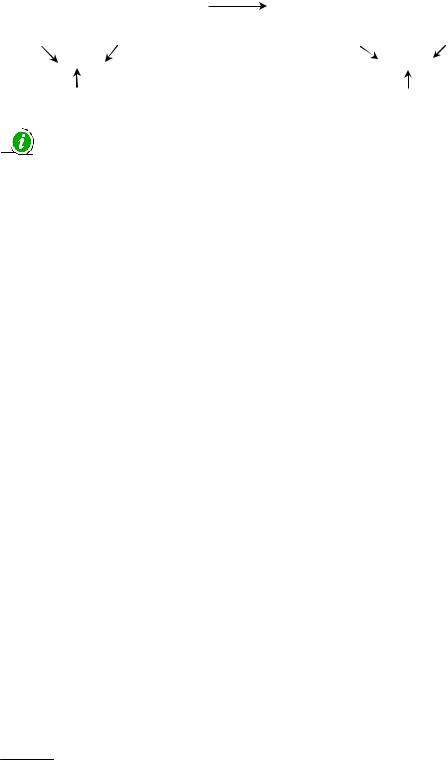
|
|
|
|
Negative forms |
|
|
|
|
|
|
|
|
|
|
|
|
|
|
|
|
|
I |
am not |
|
|
|
|
He |
She |
We |
|
You |
|||
|
|
is not |
|
are not |
||||
|
|
It |
|
|
|
|
They |
|
|
|
|
|
|
|
|
Table 1.5 |
|
|
|
|
Long and short forms of the verb to be |
|||||
|
|
|
|
|
|
|
|
|
|
|
|
Affirmative |
|
Negative |
|
||
|
|
|
|
|
|
|
|
|
Long forms |
|
Short forms |
Long forms |
|
Short forms |
|||
I am |
|
I’m |
I am not |
|
I’m not |
|
||
you are |
|
you’re |
you are not |
|
you aren’t |
|
||
he is |
|
he’s |
he is not |
|
he isn’t |
|
||
she is |
|
she’s |
she is not |
|
she isn’t |
|
||
we are |
|
we’re |
we are not |
|
we aren’t |
|
||
you are |
|
you’re |
you are not |
|
you aren’t |
|
||
they are |
|
they’re |
they are not |
|
they aren’t |
|
||
1.10.Put the words into the correct order, as in the model.
Model: – student? / Henry / Is / a good
–Is Henry a good student?
1.aunt. / my / is / She
2.Steffi / from / Is / Germany?
3.boyfriend / new / your / intelligent? / Is
4.Jenkins. / surname / His / is
5.Wilma and Donald / married? / Are
6.short / and slim. / is / Valeria
7.you / Clara Fox? / Are
8.is / 104, / My / Market Street. / address
9.phone / number / 6484011? / his / Is
10.Julia. / name / Her / is
11.very / This / is / interesting. / story
12.in / street. / A new / is / house / our
13.her / tall? / Is / husband
14.are / We / Russia. / from
12

1.11.Make the following sentences negative, as in the model.
Model: – My boyfriend is Italian. (French)
–No, he isn’t. He isn’t Italian. He is French.
1.She is an actress. (a secretary)
2.He is single. (married)
3.They are husband and wife. (brother and sister)
4.It is my diary. (his diary)
5.I am very intelligent. (your wife)
6.They are from Russia. (England)
7.Her husband is an engineer. (an electrician)
8.Steven is twenty-five years old. (twenty-six)
9.You are stupid. (intelligent)
10.He is from London. (Oxford)
11.She is a teacher at school. (at the university)
12.They are students. (pupils)
1.12.Make the following sentences negative or interrogative, as in the model.
Model: – I am seventeen. (–)
–I’m not seventeen.
–She is my daughter. (?)
–Is she your daughter?
1.They are married. (–)
2.She is from Spain. (?)
3.I am a driver. (–)
4.Her boyfriend is from Germany. (?)
5.He is a teacher. (–)
6.They are from Australia. (–)
7.It is near the chair. (?)
8.You are Russian. (–)
9.I am German. (?)
10.I am a student. (?)
11.He is a pilot. (–)
12.We are from Italy. (?)
13.My name is John Winston. (?)
14.I am seventeen years old. (?)
15.Her name is Julia. (–)
13
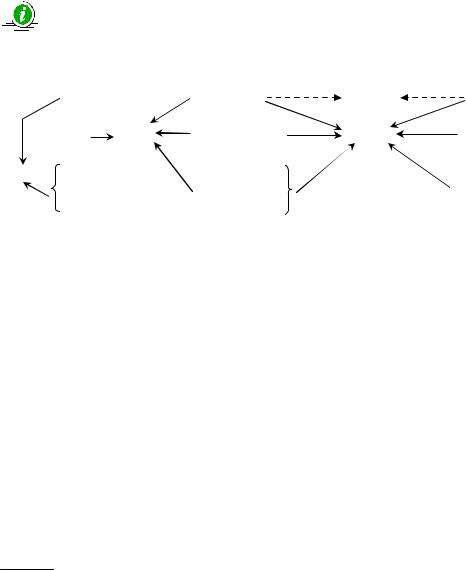
1.13.Complete the dialogue using the cues, as in the model.
Model: – your / name?
–What’s your name?
–Roberta Stone.
1. you / from / London? |
… |
– No, I’m from Liverpool. |
2. you / English? |
… |
– Yes, I am. |
3. your / job? |
… |
– I’m an actress. |
4. you / married? |
… |
– No, I’m single. |
5. your / address? |
… |
– 35, South Street. |
Table 1.6
Past Simple and Future Simple forms of the verb to be
|
Past Simple |
|
|
Future Simple |
|
|
|
|
|
|
|
|
|
|
I |
|
We |
I |
shall be |
We |
|
You |
were |
You |
You |
will be |
You |
was |
He |
|
|
He |
|
|
|
She |
|
They |
She |
|
They |
|
It |
|
|
It |
|
|
Short negative forms: |
|
Short negative forms: |
|
|||
wasn’t, weren’t |
|
|
shan’t be, won’t be |
|
||
|
|
|
|
|
|
|
1.14.Complete the following sentences with the correct form of the verb to be.
1. |
He … a computer programmer. |
|
|
|
a) am |
b) were |
c) is |
2. |
Her hobby … tennis. |
|
|
|
a) are |
b) were |
c) is |
3. |
They … active members of our English club last year. |
||
|
a) will be |
b) were |
c) are |
4. |
The weather … nice tomorrow. |
|
|
|
a) will be |
b) is |
c) was |
14

5. |
I hope it … cold next Friday. |
|
|
|
a) isn’t |
b) wasn’t |
c) won’t be |
6. |
He … in Kiev in two days’ time. |
|
|
|
a) is |
b) will be |
c) was |
7. |
‘… you at the University yesterday?’ ‘Yes, I … .’ |
||
|
a) Was; was |
b) Was; am |
c) Were; was |
8. |
… you busy now? |
|
|
|
a) Is |
b) Were |
c) Are |
9. |
What country … you from? |
|
|
|
a) are |
b) was |
c) is |
10.When I … a small child I … very noisy, but now I … not.
a)were, was, am b) was, was, am c) was, was, was
1.15.Complete the following sentences with the full form of the verb to be.
1.We … in Italy last summer.
2.I think you … free next Saturday.
3.My diary … on the table.
4.We … married.
5.Your brother … here two hours ago.
6.He … a programmer in five years’ time.
7.My cousin … twenty-five years old.
8.They … French.
9.My surname … White.
10.She … quite tall, slim and pretty.
11.I … Roberta King.
12.I hope you … back in a couple of days.
1.16.Translate the following sentences into English.
1.Моя сестра – учительница.
2.Завтра я буду занят.
3.Где вы были вчера?
4.Она замужем.
5.Они из Лондона? – Нет, они из Оксфорда.
6.Когда она была молодой, она была очень хорошенькой.
7.Вы программист?
15

8.Джону десять лет.
9.Ее муж не итальянец, он немец.
10.Из какой вы страны?
|
|
|
|
|
Table 1.7 |
|
|
Present Simple forms of the verb to have (got) |
|||
|
|
||||
|
|
|
|
|
|
|
I |
We |
He |
She |
|
|
|
have got |
|
has got |
|
|
You |
They |
It |
||
|
|
|
I have got a brother. |
|
|
|
|
|
He has got a car. |
|
|
|
|
|
Short forms: I’ve got |
(= I have got) |
|
|
|
|
She’s got |
(= She has got) |
|
|
|
|
|
||
Have you got a brother? – Yes, I have. / No, I haven’t. (= |
have not) |
||||
Has he got a car? |
– Yes, he has. / No, he hasn’t. (= |
has not) |
|||
Have you got any children?
I haven’t got a brother.
He hasn’t got a car.
We haven’t got any children.
1.17.Fill in the gaps with the correct form of the verb to have (got).
1.‘… you … a computer?’ ‘No, I … .’
2.I … a dog, but my friend … a Siberian cat.
3.‘… you … any books in your bag?’ ‘Yes, I … .’
4.‘… Donald … his own family?’ ‘No, he …, but I … .’
5.‘… Ann … a new coat?’ ‘Yes, she … a very nice coat.’
6.‘… they … a new job?’ ‘Yes, they … .’
7.‘… your friend … an aunt or an uncle?’ ‘He … an old aunt.’
8.We … any money, but Susan and Robert … three thousand dollars.
9.‘… we … a calculator?’ ‘Yes, we … .’
10.‘… you … any sisters or brothers?’ ‘No, I … .’
11.‘… she … any friends in London?’ ‘Yes, she … .’
12.You always … any money on you!
13.Dick … a wife, but he … a girlfriend.
16
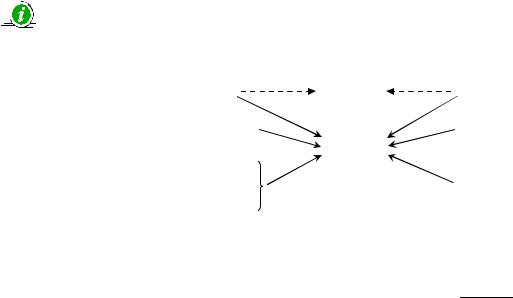
1.18.Change the following statements into negatives, as in the model.
Model: – Uncle Henry’s got a new hat. (a coat)
–He hasn’t got a new coat.
1.He’s got a sister. (a brother)
2.Adolph’s got a camera. (a personal stereo)
3.They’ve got a son. (a daughter)
4.Our grandmother’s got a TV. (a DVD player)
5.I’ve got a brother. (a sister)
6.Wilma’s got a notebook in her bag. (a diary)
7.We’ve got a calendar on the table. (a magazine)
8.You’ve got a good job. (a good salary)
9.They’ve got a beautiful car. (a flat)
10.The table’s got four legs. (three legs)
1.19.Make the following sentences affirmative, as in the model.
Model: – Tom hasn’t got a pen. (a pencil)
–He’s got a pencil.
1.He hasn’t got a grandfather. (two grandmothers)
2.I haven’t got a girlfriend. (a wife)
3.Clementine hasn’t got a son. (a daughter)
4.We haven’t got an uncle. (an aunt)
5.Oliver and Kate haven’t got a dog. (a cat)
|
|
|
|
|
|
|
Table 1.8 |
|
|
|
Past Simple and Future Simple forms of the verb to have |
||||
|
|
|
|||||
|
|
|
|
|
|
|
|
|
|
|
Past Simple |
|
|
Future Simple |
|
|
|
|
|
|
|
|
|
I |
|
We |
I |
shall have |
We |
||
You |
had |
You |
You |
will have |
You |
||
He |
|
|
He |
|
|||
|
|
|
|
||||
She |
|
They |
She |
|
They |
||
It |
|
|
It |
|
|
||
|
|
|
|
|
Short form – ’ll |
|
|
|
|
|
|
|
|
Short negative forms: |
|
|
|
|
|
|
|
shan’t have, won’t have |
|
17

1.20.Complete the following sentences with the correct form of the verb to have (got).
1.My husband and I … sometimes … a lot of problems.
2.When I was younger, I … a lot of friends, but now I … any.
3.I think we … a new house next year.
4.They … a son and two daughters.
5.He … enough money five years ago, but now he … much.
6.Our children … dark brown hair.
7.When he was seventeen, he … a motorbike, but now he … an expensive car.
8.I am sure I … a modern computer in three years’ time.
1.21.Translate the following sentences into English.
1.У них трое детей: два сына и дочь.
2.Я уверен, что через два года у меня будет новый дом.
3.У нас много проблем.
4.Когда Питер был молодым, у него были темные волосы.
5.У тебя есть собака? – Нет, у меня кошка.
6.У него есть автомобиль? – Да.
1.22.Choose the correct answer to the following questions.
1.What’s your first name?
a) John White. |
b) Monica. |
c) Dr. Higgins |
2. How old are you? |
|
|
a) Hello. |
b) Twenty-six. |
c) I’m one meter sixty-three. |
3.Where are you from?
a) I’m from Russia. b) I’m American. c) I’m an artist.
4.Are you married?
|
a) No, it isn’t. |
b) No, I’m single. c) Yes, it is. |
|
5. |
Have you got any children? |
|
|
|
a) Yes, three. |
b) No, I’m not. |
c) Yes, I am. |
6. |
What’s your job? |
|
|
|
a) I’m forty-one. |
b) I’m married. |
c) I’m an engineer. |
18

1.23. Read the dialogue.
|
Looking for a Job |
Manager: |
Good morning, Mr. Carter. |
Mr. Carter: |
Good morning. |
Manager: |
Please, sit down. |
Mr. Carter: |
Thank you. |
Manager: |
Now, one or two questions… |
Mr. Carter: |
Yes, of course. |
Manager: |
How old are you, Mr. Carter? |
Mr. Carter: |
Thirty-five. |
Manager: |
Where are you from? |
Mr. Carter: |
I’m from Scotland. |
Manager: |
Are you Scottish? |
Mr. Carter: |
No, I’m American. |
Manager: |
Are you married? |
Mr. Carter: |
Yes, I am. |
Manager: |
Is your wife American too? |
Mr. Carter: |
No, she is Italian. |
Manager: |
What’s her name? |
Mr. Carter: |
Marcella. |
Manager: |
And her age? |
Mr. Carter: |
Pardon? |
Manager: |
How old is Mrs. Carter? |
Mr. Carter: |
Oh, she’s thirty-one. |
Manager: |
Have you got any children? |
Mr. Carter: |
Yes, two. A boy and a girl. |
Manager: |
And what are their names? |
Mr. Carter: |
Vincent and Monica. |
Manager: |
How old are they? |
Mr. Carter: |
Vincent is eleven and Monica is eight. |
Manager: |
I see. Now one more question, Mr. Carter. What’s your job? |
Mr. Carter: |
I’m an engineer. |
Manager: |
An engineer… Please, call me on Friday and I’ll tell you my |
|
decision. |
Mr. Carter: |
Thank you. |
Manager: |
Good bye, Mr. Carter. |
Mr. Carter: |
Good bye. |
1.24. Choose the correct answer.
1.How old is Mr. Carter? а) 45.
b)32.
c)35.
d)43.
2.Where’s Mr. Carter from?
a)He’s from England.
b)He’s from Scotland.
c)He’s from Italy.
d)He’s from America.
19

3. What’s his wife’s name? |
4. Is his wife American? |
a) Monica. |
a) Yes, she is. |
b) Marcella. |
b) No, she’s British. |
c) Marta. |
c) No, she’s Italian. |
d) Miranda. |
d) No, she is German. |
5. How many children have the |
6. How old are the children? |
Carters got? |
a) Vincent is 13 and |
a) Three. |
Monica is 8. |
b) Two, a son and a daughter. |
b) Vincent is 11 and |
c) Just one. |
Monica is 9. |
d) Two daughters. |
c) Vincent is 12 and |
|
Monica is 9. |
|
d) Vincent is 11 and |
|
Monica is 8. |
1.25. Work in pairs. Ask and answer the following questions, then report your answers to the class.
1.What is your first name and surname?
2.Where and when were you born?
3.How old are you?
4.What’s your job?
5.What’s your address?
6.What’s your phone number?
7.What are you like?
8.Are you married or single?
9.Have you got a large family?
10.Is your family friendly?
11.Have you got any sisters or brothers?
12.How many relatives have you got? What are their names?
1.26. Talk about the person you know well. Think about the
following: |
|
– name and age |
– brothers and sisters |
– general appearance |
– a telephone number |
– height |
– a job |
– built |
– an address |
– a date of birth |
– hobby and interests |
– a place of birth |
– personality |
20

1.27. Complete Vladislav’s letter to a penfriend using the cues.
Hello my unknown friend,
I … Vladislav, Vlad for short. Vladislav … my … name and Komarov is my … . I … Russian. I am 18. Now I am a first-year … (студент) of Tomsk State University. I am not … (женат) yet, but I … got a … (подруга). … name … Natasha. She … a student too. She is not … (высокая), … (довольно) fair and very … (хорошенькая).
Some words about my parents. My … (мать) is a … (учительница) of English. … is forty-four. She is tall and … (стройная). She is quite a … (симпатичная) woman. My … (отец) is a computer programmer. … is tall and … (темноволосый), very strong and … (умный). My … (сестра), Vera, is … (замужем). She is a … (врач). Her … (муж), Ivan, is an … (инженер). They … got two children: a … (дочь) and a … (сын). Their daughter, Dasha, is four and their son, Igor, … two.
We … got a lot of relatives: … (дяди), … (тети) and … (двоюродные братья и сестры). We are a friendly … (семья).
What about you?
…is your name? … old are you? … is your job? … you married?
…you … any sisters or brothers?
Please, write me soon.
Best wishes,
Vlad.
1.28. Read the text.
BILL GATES
William Henry Gates III (born October 28, 1955) is an American entrepreneur, philanthropist and chairman of Microsoft, the software company he founded with Paul Allen.
Gates was born and grew up in Seattle, Washington, the USA. His father, William H. Gates II was a Seattle attorney and his mother, Mary Maxwell Gates was a school teacher and chairperson of the United Way Сharity. Gates and his two sisters attended the exclusive secondary “Lakeside School” and had a comfortable upbringing.
Bill Gates started studying at Harvard University in 1973 where he met up with Paul Allen. Gates and Allen worked on a version of the programming language BASIC that was the basis for the MITS Altair (the first microcomputer available). He did not go on to graduate from Harvard University as he left in his junior year to start what was
21

to become the largest computer software company in the world – Microsoft Corporation.
In 1975, the company Microsoft was formed, which was an abbreviation of microcomputer software. It soon became simply “Microsoft”® and went on to completely change the way people use computers. Microsoft helped to make the computer easier to use with its developed and purchased software, and made it a commercial success. The success of Microsoft began with the MS-DOS computer operating system that Gates licensed to IBM. The Microsoft monopoly sets about completely dominating every market it enters through acquisition, aggressive business tactics or a combination of them. Many of the largest technology companies have fought legally against the actions of Microsoft, including Apple Computer, Netscape, Opera, WordPerfect, and Sun Microsystems.
Gates is one of the best-known entrepreneurs of the personal computer revolution. Although he is widely admired, his business tactics have been criticized as anti-competitive and in some instances ruled as such in court. Since amassing his fortune, Gates has pursued a number of philanthropic endeavors, donating large amounts of money to various charitable organizations and scientific research programs through the Bill & Melinda Gates Foundation, established in 2000.
In March 2005, William H. Gates received an “honorary” knighthood from the queen of England. Gates was bestowed with the KBE Order (Knight Commander of the Most Excellent Order of the British Empire) for his services in reducing poverty and improving health in the developing countries of the world.
Bill Gates continues to play a very active role in the workings of the Microsoft Company, but has handed the position of CEO over to Steve Ballmer. Gates now holds the positions of chairman and chief software architect and remains the largest individual shareholder with more than 8% of the common stock. The annual Fortune magazine’s list of The World’s Billionaires has ranked Gates as the richest person in the world from 1995 to 2006, with recent estimates putting his net worth near $56 billion. When family wealth is considered, his family ranks second behind the Walton family, heirs of Wal-Mart founder Sam Walton. In July 2007, Fortune Magazine reported that the increase in value of Mexican billionaire Carlos Slim’s holdings of stock caused him to surpass Bill Gates as the world’s richest man. Fortune however maintains that Carlos Slim Helú is still placed second to Bill Gates as of its last calculation billionaire fortunes. Forbes does not plan to recalculate Carlos Slim Helú’s wealth until next year.
Bill Gates lives near Lake Washington with his wife Melinda French Gates and their three children. Interests of Gates include reading, golf and playing bridge.
1.29. Match the following words and expressions with their equivalents.
1. an entrepreneur |
a) рыцарство, рыцарское звание |
2. a software company |
b) сохранять положение |
22

3. upbringing |
с) благосостояние семьи |
4. to meet up with smb. |
d) накопить состояние |
5. to go on |
e) наследник |
6. operating system |
f) компания-разработчик программного |
|
обеспечения |
7. in some instances |
g) давать, даровать, награждать |
8. to amass a fortune |
h) повстречаться с кем-л. |
9. knighthood |
i) акционер, держатель акций |
10. to bestow |
j) в отдельных случаях |
11. to hold the position |
k) операционная система |
12. a shareholder |
l) предприниматель |
13. a net worth |
m) (чистый) собственный капитал |
14. family wealth |
n) воспитание |
15. a heir |
o) продолжать |
1.30.Answer the following questions.
1.When and where was Bill Gates born?
2.What were his parents?
3.Did he graduate from Harvard University?
4.When was the company Microsoft formed?
5.What did the success of Microsoft begin with?
6.What companies have fought legally against the actions of Microsoft?
7.What year was Bill Gates bestowed with the KBE Order?
8.Which positions does Bill Gates hold now?
9.Who is the richest person in the world: William Henry Gates III or Carlos Slim Helú?
10.What are Bill Gates’s interests?
1.31.Read the following international words and notice their pronunciation.
сompany |
[`kAmpqnI] |
рrogramming |
[`prqugrxmIN] |
basis |
[`beIsIs] |
start |
[stRt] |
commercial |
[kq`mWS(q)l] |
market |
[`mRkIt] |
interests |
[`Int(q)rqsts] |
monopoly |
[mq`nOp(q)lI] |
tactics |
[`txktIks] |
action |
[`xkS(q)n] |
technology |
[tek`nOlqGI] |
fortune |
[`fLCHn] |
position |
[pq`zIS(q)n] |
architect |
[`RkItqkt] |
person |
[`pWs(q)n] |
golf |
[gOlf] |
calculation |
[`kxlkju`leIS(q)n] |
role |
[rqul] |
23

|
|
|
|
Table 1.9 |
|
|
|
Articles a (an) and the |
|
|
|
|
||
|
|
|
|
|
|
|
A (an) = one |
|
The = that |
|
|
I see a man in the street. |
|
The man I see is your brother. |
|
|
|
|
|
For more detailed information see Grammar Reference (Unit 1)
1.32.Complete the following sentences with a, an, the or – .
1.I have got … English book.
2.This boy is … student of … group 3.
3.Is Mary from … Manchester or from … London?
4.Come to … blackboard and write … Exercise 2.
5.There is … picture on … page 20.
6.Open … door, please.
7.You have got … mistake in … word “correspondence”.
8.… Mississippi is … longest river in … world.
9.What is … capital of … Spain?
10.There were only … two people in … hall.
11.Elbrus is … highest mountain in … Caucasus.
12.Where is … Sahara Desert?
|
|
|
|
Regular Plurals |
Table 1.10 |
|
|
|
|
|
|
|
|
|
|
|
|
|
|
|
|
|
|
|
|
|
-s [z] |
-s |
-s [s] |
|
|
|
|
||
a boy + -s |
boys |
a parent + -s |
parents |
||
a girl + -s |
girls |
|
|
||
|
|
|
|
-es [Iz] |
|
|
|
|
an address + -es |
addresses |
|
a potato – potatoes
Exceptions: a piano – pianos, a solo – solos, a photo – photos, radio – radios, studio – studios
a family + -es families
-f, -fe: a wife – wives, a scarf – scarves (but: a chief – chiefs, a roof – roofs)
24
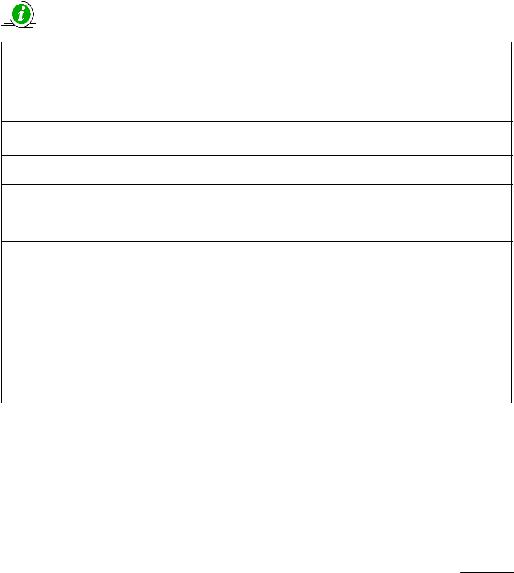
1.33. Divide the following nouns into four columns.
-s |
-es |
-ies |
-ves |
|
|
|
|
engineers |
waitresses |
diaries |
housewives |
|
|
|
|
Actor, electrician, body, photographer, half, actress, waiter, camera,
secretary, watch, |
chair, kiss, country, table, tomato, uncle, daughter, |
||
radio, piano, loaf, |
party, photo, shelf, fox, lady, solo, phone, key, studio, |
||
life, handkerchief, |
bench. |
||
|
|
|
Table 1.11 |
|
|
|
Irregular Plurals |
|
|
|
|
|
|
|
|
|
|
|
a man – men, a woman – women |
a tooth – teeth, a goose – geese, a foot – feet a mouse – mice, a louse – lice
an ox – oxen, a child – children
a person – people
an aircraft – aircraft, a sheep – sheep, a swine – swine, a fish – fish, a deer – deer
an analysis – analyses, |
a basis – bases, a crisis – crises, a thesis – theses, |
||
a criterion – criteria, a datum – data, a phenomenon – phenomena |
|||
|
|
|
|
|
Only singulars: |
|
Only plurals: |
money, |
hair, business, fruit, |
trousers, jeans, shorts, glasses, scissors, |
|
progress, |
advice, information, |
people, police, clothes, goods, riches, |
|
news, |
knowledge, |
furniture, |
manners, thanks |
luggage, peace, love |
|
|
|
|
|
|
|
1.34. Point out the nouns which have irregular plural form.
Boy, girl, postman, aunt, mother, nephew, parent, businesswoman, uncle, cousin, person, brother, grandmother, daughter, wife, father, niece, grandfather, man, child, husband, son, ox, police, luggage, swine, basis, advice, tooth.
25
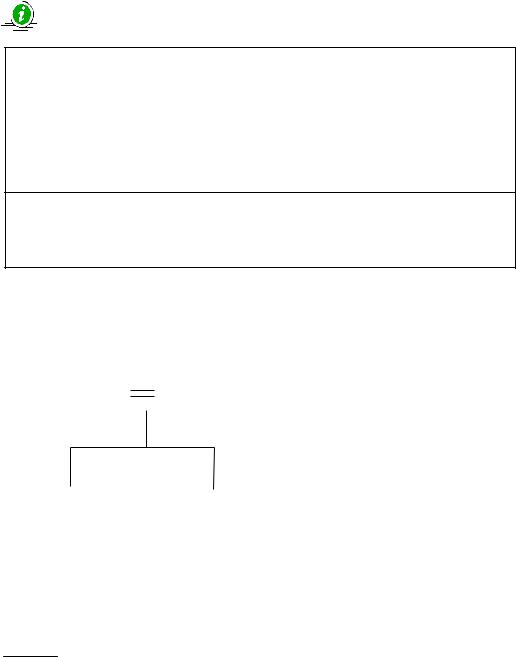
1.35. Write plural form of the following nouns.
A person – … , a businessman – … , a policewoman – … , a child – … , a tooth – … , a goose – … , a foot – … , a mouse – … , an analysis – … , a fish – …, an aircraft – … , a sheep – … , a country – … , a tomato – … , a photo – … , an actress – … , а camera – … , a life – … .
Table 1.12
Possessive Case: formation and examples
Diana’s brother (= the brother of Diana) but:
Diana and Richard’s brother ( = brother of Diana and Richard) She is Dan’s girlfriend = She is his girlfriend.
[s]Kate’s boyfriend
[z]Ronald’s car; Anna’s flat
[Iz] Dess’s computer
his son’s name = the name of his son his sons’ names = the names of his sons
But: his children’s names = the names of his children
1.36. Look at the family tree and complete the sentences below.
Family tree
Dave |
|
Sally |
|
|
|
|
|
|
Kate |
|
Alex |
|
|
|
|
|
|
1.Dave is Sally’s …. .
2.Sally is Dave’s …. .
3.Alex is Dave’s …. .
4.Kate is Sally’s …. .
5.Kate is Alex’s …. .
6.Alex is Kate’s …. .
26

1.37.Complete the following sentences with the right possessive form of the nouns in brackets, as in the model.
Model: – She is his girlfriend. (Rob)
–She is Rob’s girlfriend.
1.It is her book. (Helen)
2.This boy is their son. (Richard and Anna)
3.These are her glasses. (my grandmother)
4.His studio is very large. (the photographer)
5.Their parents are teachers. (Diana and Bob)
Table 1.13
Differences between possessive -’s(’), plural -s and contraction -’s
Possessive -’s (’) |
Her son’s friend is a student. |
|
Their friends’ room is good. |
|
|
Contraction -’s |
Her son’s a worker. = Her son is a worker. |
|
|
Plural -s |
They are good friends. |
|
|
1.38.Choose the sentences with the short form of the verb to be.
1.Andrew’s married.
2.Paul and Jack’s mother is an engineer.
3.Kate’s doctor is from the USA.
4.Antonia’s her sister.
5.Our secretary’s room is not far from here.
6.Her children’s names are Pete and Steve.
7.My sister’s very pretty.
8.Dess’s son is not intelligent at all.
9.The woman’s a widow.
10.Your sister’s flat is dark.
1.39.Complete the following sentences with plural -s, possessive -’s (’) or contraction -’s.
1.Jane is Sam… wife.
2.I’ve got three daughter… .
27

3.My husband… name… Paul.
4.His parents… surname… Watson.
5.Her brother… wife… name… Svetlana.
6.My boyfriend… from Spain.
7.My grandmother… sister… very old.
8.His sons… computer… good.
9.Andrew… quite fat.
10.Her husband… stupid.
1.40. Use the information from the box and answer the questions below, as in the model.
NAME |
Edward Quinton |
AGE |
27 |
NATIONALITY |
Australian |
JOB |
driver |
ADDRESS |
45, North Road |
PHONE NUMBER |
586 07 3319 |
MARITAL STATUS |
married |
WIFE’S NAME |
Sheila |
WIFE’S AGE |
25 |
CHILDREN |
2 girls |
CHILDREN’S NAMES |
Lucy and Veronica |
CHILDREN’S AGES |
Lucy (5), Veronica (3) |
Model: – What’s his first name?
–His first name is Edward.
1.What’s his surname?
2.How old is he?
3.What’s his nationality?
4.What’s his job?
5.What’s his address?
6.What’s his phone number?
7.Is he married?
8.What’s his wife’s name?
9.How old is she?
10.How many children has he got?
11.What are their names?
12.How old are they?
28

Unit 2. ONE DAY IN MY LIFE
|
|
|
|
|
Cardinal Numbers |
|
Table 2.1 |
|
|
|
|
|
|
|
|
||
|
|
|
|
|
|
|
||
|
|
|
|
|
|
|
|
|
|
|
|
1–10 |
|
11–19 |
|
|
20–90 |
|
|
|
|
|
|
|
|
|
1 |
|
one |
11 |
eleven |
|
-ty |
|
|
|
|
|
|
|
|
|
|
|
2 |
|
two |
12 |
twelve |
|
20 |
twenty |
|
|
|
|
|
|
|
|
|
|
3 |
|
three |
13 |
thirteen |
|
30 |
thirty |
|
|
|
|
|
|
|
|
|
|
4 |
|
four |
14 |
fourteen |
|
40 |
forty |
|
|
|
|
|
|
|
|
|
|
5 |
|
five |
15 |
fifteen |
|
50 |
fifty |
|
|
|
|
|
|
|
|
|
|
6 |
|
six |
16 |
sixteen |
|
60 |
sixty |
|
|
|
|
|
|
|
|
|
|
7 |
|
seven |
17 |
seventeen |
|
70 |
seventy |
|
|
|
|
|
|
|
|
|
|
8 |
|
eight |
18 |
eighteen |
|
80 |
eighty |
|
|
|
|
|
|
|
|
|
|
9 |
|
nine |
19 |
nineteen |
|
90 |
ninety |
|
|
|
|
|
|
|
|
|
|
10 |
|
ten |
|
|
|
|
|
|
|
|
|
|
|
|
|
|
|
2.1. Write the numbers for the following words.
three |
thirteen |
thirty |
four |
fourteen |
forty |
five |
fifteen |
fifty |
six |
sixteen |
sixty |
seven |
seventeen |
seventy |
eight |
eighteen |
eighty |
nine |
nineteen |
ninety |
a hundred |
|
|
2.2. Match the following words with the stress pattern, as in the model.
Model: `three |
`thir`teen |
`thirty |
||
|
`four |
`four`teen |
`forty |
|
fifteen |
sixty |
five |
seven eight |
sixteen fifty nineteen six eighteen |
ninety |
eighty |
seventy |
seventeen |
nine |
29

|
|
|
|
|
Ordinal Numbers |
|
Table 2.2 |
|
|
|
|
|
|
|
|
|
|
|
|
|
|
|
|
|
|
|
|
|
|
|
|
|
|
|
1st–10th |
|
11th–19th |
|
20th–90th |
1st |
the first |
11th |
the eleventh |
|
|
||
2nd |
the second |
12th |
the twelfth |
20th |
the twentieth |
||
3rd |
the third |
13th |
the thirteenth |
30th |
the thirtieth |
||
4th |
the fourth |
14th |
the fourteenth |
40th |
the fortieth |
||
5th |
the fifth |
15th |
the fifteenth |
50th |
the fiftieth |
||
6th |
the sixth |
16th |
the sixteenth |
60th |
the sixtieth |
||
7th |
the seventh |
17th |
the seventeenth |
70th |
the seventieth |
||
8th |
the eighth |
18th |
the eighteenth |
80th |
the eightieth |
||
9th |
the ninth |
19th |
the nineteenth |
90th |
the ninetieth |
||
10th |
the tenth |
|
|
|
|
||
2.3. Match the ordinal numbers with the cardinal ones.
1. one |
a) twelfth |
2. two |
b) fifth |
3. three |
c) ninth |
4. four |
d) second |
5. five |
e) seventh |
6. six |
f) first |
7. seven |
g) tenth |
8. eight |
h) third |
9. nine |
i) eleventh |
10. ten |
j) fourth |
11. eleven |
k) sixth |
12. twelve |
l) eighth |
2.4. Write the missing numbers in words.
20 twenty |
21 twenty-one |
30 thirty |
34 thirty-four |
40 forty |
45 … |
50 fifty |
52 … |
60 sixty |
69 … |
70 seventy |
76 … |
80 eighty |
87 … |
90 ninety |
98 … |
100 one hundred |
300 … |
|
|
200 two hundred
30

Table 2.3
There is / There are
There is (there’s) a library in the town.
There are some tables and chairs in the room.
There is not (there isn’t) a computer room in the college.
There are not (there aren’t) any students in the library.
Is there a car park near here?
– Yes, there is. / No, there isn’t.
Are there two students from Italy in your group?
– Yes, there are. / No, there aren’t.
How many people are there in your family?
– There are three people in my family: my mother, my father and me.
2.5. Fill in there is / there isn’t / is there / are there / there are / there aren’t.
1.Oxford is an old town. … many modern buildings there.
2.Excuse me. … a library at the university?
3.… nobody in the classroom. Where are the students?
4.‘How many teachers … at the college?’ ‘Thirty.’
5.‘… any problems with the teacher of Physics?’ ‘No, everything is all right.’
6.… seven days in a week.
7.There is a gym in our school but … a tennis court.
8.… four people in my family: my parents, my elder sister and me.
9.… five hostels in the university area?
10. My room is quite big. … a table, two chairs, a sofa, a TV and a computer.
2.6. Read the text and answer the following questions.
1.Where is the International College of Business?
2.Why is it international?
3.What is Ingrid’s tutor’s name?
4.Where are the students from Ingrid’s group from?
5.How many teachers are there at the college?
6.Is there a library at the college?
7.Is Oxford a beautiful town?
31

WELCOME TO THE INTERNATIONAL COLLEGE OF BUSINESS
My name is Ingrid and I am a student of the International College of Business in Oxford. At our college there are three hundred students from twenty countries. There are thirty students’ groups of different specialties: banking, national economics, business and finance, management, etc. There are ten students in our group, fifteen classrooms and twenty five teachers. In each modern classroom there are tables, chairs and computers. In the language laboratory there is a cassette player, a TV and a DVD player. There are two self-study rooms and a big library with a spacious reading hall. There is also a college café and a car park.
My group is very international. There are two students from Brazil, two students from Germany, four students from Japan and two students from Italy. Our tutor’s name is Rachel. She is kind and friendly. We live in a hostel not far from the college. Oxford is a very beautiful town. There are a lot of small and beautiful streets and nice old buildings. I like studying here a lot.
2.7. Write a brochure for your ideal school. Mention the following things:
–what the school is called
–where your school is
–the number of students there are
–the number of teachers there are
–what there is in the school
–what there is in each classroom
2.8. Read the following words and expressions and pay attention
to the examples. |
|
a hostel |
My friend lives in a College hostel. |
общежитие |
|
far from |
The bus stop is far from the city center. |
далеко от |
|
different (from) |
In our group there are many students from |
различный, отличный (от) |
different cities of the country. |
to get on well together |
Sue and I never get on well together. |
иметь хорошие отношения |
|
the same as |
We have the same number of lessons |
такой же как |
during this term as we had during the last |
|
one. |
32

the faculty of management and finance
факультет управления и финансов
to have much in common
иметь много общего
fairly
довольно
а light breakfast
легкий завтрак
to leave for work
уходить на работу
the main building
главный корпус
to go on foot
ходить пешком
to come late
опаздывать
delicious
вкусный
free
свободный
a sport society
спортивная секция
three times a week
три раза в неделю
twice a year
два раза в год
to take part
принимать участие
to keep an eye on smb. (smth.)
следить за кем-л. (чем-л.)
The faculty of management and finance is one of the most prestigious at the university.
They have much in common so they are good friends.
I start my working day fairly late.
Every morning Ann has а light breakfast because she wants to be in a good shape.
I always leave for work at a quarter to eight.
The main building of our university is not far from the place where I live.
I always go to the university on foot as I like walking a lot.
Sarah never comes late because she gets up very early.
The meal at the cafeteria is very delicious. Shall we go?
Fred is not free today as he has a lot of homework to do.
There are ten sport societies at our university.
Three times a week I go to the gym.
Twice a year all the students of our university have exams.
Joe never takes part in our research projects.
He always keeps an eye on our progress.
33

to break a rule |
My group-mates never break the rules. |
нарушать правило |
|
to fine |
A Proctor often fines the students when he |
штрафовать |
catches them. |
to dismiss from |
He wasn’t dismissed from the university |
исключить из |
because he was a good student. |
to do one’s best |
I want to do my best to pass the exams |
прилагать усилия |
before the session. |
2.9. Read the text and answer the following questions.
1.How old is Steve?
2.Where does Steve come from?
3.Does he live with his parents?
4.How many students are there in Steve’s room?
5.What faculty do they study at?
6.What time does Steve get up?
7.How many students are there in the group?
8.What time do the lessons start?
9.What does Steve do in the evening?
10.What time does Steve usually go to bed?
STEVE’S WORKING DAY
Steve is nineteen years old and he is from California, the USA. Now he is a student at Cambridge University. He lives in a hostel not far from the university. There are three more students in his room: one from Switzerland and two from France. They are from different countries but they get on well together. They study at the same faculty, the faculty of management and finance and have much in common. They are future specialists in the sphere of business and national economics.
Steve starts his day fairly early. He gets up at half past six and has a shower. After that he has a light breakfast and leaves for the university at a quarter past seven. It takes him about twenty minutes to get to the main building of the university. Steve goes on foot and he never comes late.
There are twenty-three students in his group. Every day they have three or four pairs of lessons. The lessons start at eight o’clock and finish at a quarter to five. In the afternoon, between the second and the third pairs, students have lunch. Some students go to the university cafeteria; the others have lunch in the hostel. Steve usually goes to the café which is not far from the university because the meal there is quite cheap and delicious.
34

After lessons all the students are free. There are over ten sport societies at the university for those who like sport. Steve is very sporty. He likes swimming a lot so three times a week he goes to the swimming-pool. Steve is a member of the university swimming team and twice a year, in April and October, he takes part in the swimming competitions among the students of different faculties.
Students who do not like sport can go to other clubs in accordance with their interests. At the university there is a big library. It opens at eight a.m. and closes at half past seven p.m. It also works on Saturday and Sunday. Steve often goes to the library especially when he has History, Economics and Management.
In the evening Steve has supper, does his homework, watches TV or reads books. The students can stay out till twelve o’clock. Every evening a Proctor with two assistants, the so-called “Bulldogs”, walks around the students’ town and keeps an eye on the students’ behavior. If he sees a student who breaks the rules of the university, he comes up to him and says, ‘Are you a student of the university, sir?’ and if a student runs away, then the “Bulldogs” run after him and fine him. Apart from fines a student may be dismissed from the university for one term.
Steve never breaks the rules. He goes to bed at eleven p.m. as well as his room-mates. Steve is a good student. He works hard and does his best to be a good specialist in economics and management.
2.10.Read the text again and find:
–three times of the day
–three meals
–things you do every day
2.11.Match the following expressions with their equivalents.
1. to work hard |
а) соревнование по плаванию |
2. to go to bed |
b) университетская столовая |
3. a good specialist in economics |
c) поведение студентов |
4. a swimming-pool |
d) в соответствии с чем-либо |
5. a university cafeteria |
e) одеваться |
6. in accordance with smth. |
f) уходить из дома |
7. to have a shower |
g) ложиться спать |
8. to do homework |
h) усердно (тяжело) работать |
9. a swimming competition |
i) принимать душ |
10. students’ behavior |
j) просыпаться |
11. to wake up |
k) хороший специалист |
12. to get dressed |
в экономике |
13. to leave home |
l) бассейн |
|
m) делать домашнее задание |
35

2.12.Complete the following sentences with the expressions from the box.
gets dressed |
the university cafeteria |
In accordance with |
||
swimming competitions |
a good specialist in this field |
go to bed |
||
works hard |
get on well together do my best |
has a light breakfast |
||
to take part |
sport society |
leave home break the rules |
far from |
|
|
|
|
|
|
1.We usually don’t have much time for lunch, so we go to … … … .
2.… … … the academic plan, students attend ten lectures on the History of Russia during the first term.
3.The students of my group are very friendly and we always … … … …
.
4.Lucy likes swimming and she often takes part in … … .
5.I am very good at Physics. I am trying to … … … to get only excellent marks.
6.Jack … … because he wants to pass the exams in time.
7.Philip teaches Economics at the university because he is … … … …
…… .
8.After Joan gets up, she has a shower, then she … … .
9.Ann … … … … , just a cup of tea and some biscuits.
10.I am a night owl, so I always … … … very late.
11.I live not far from the university so I never … … before 8.30 a.m.
12.All the students of our department have … … … in annual conferences in our country as well as in other ones.
13.If you like sport you have got the chance to join any … … according to your interest.
14.My room-mates never … … … of the hostel where they live. Otherwise, they may be dismissed from the university.
15.I live … … the city center so it takes me about one hour and a half to get there.
2.13. Read the following words and notice their pronunciation.
competition [`kOmpq`tIS(q)n] |
behavior [bI`heIvjq] |
especially [Is`peS(q)lI] |
different [`dIf(q)r(q)nt] |
building [`bIldIN] |
library [`laIbr(q)rI] |
usually [`jHZ(q)lI] |
delicious [dI`lISqs] |
together [tq`geDq] |
shower [`Squq] |
36

Table 2.4
Present Simple Tense
I always do my homework in the evening.
He always does his homework in the evening.
I do not (don’t) do my homework in the morning.
We do not (don’t) have lessons on Sundays.
He does not (doesn’t) do his homework in the morning.
She does not (doesn’t) work in a shop.
Do you have lunch at the university cafeteria?
– Yes, I do. / No, I don’t.
Does he work in an office?
– Yes, he does. / No, he doesn’t.
What time do you go to bed? – I go to bed late.
Where does he live? – He lives in the hostel.
2.14.Find the examples of the present simple tense in the text “Welcome to the International College of Business”.
2.15.Complete the following sentences with the present simple form of the verb in brackets, as in the model.
Model: – My friend … Russian literature very well. (know)
–My friend knows Russian literature very well.
1.I … to the University at 8.40 a.m. (come)
2.The lectures usually … at 8.50 a.m. (start)
3.After lessons Ann … to the library. (go)
4.We … on Sundays. (not study)
5.Andrew … a lot of English words. (know)
6.Nobody … me with my homework. (help)
7.… your group-mates … all the lectures? (attend)
8.Our teacher never … late. (come)
9.Sandra … many friends at the university. (not have)
10.Students … new words before the lesson. (revise)
11.Henry is very shy so he never … in students’ conferences. (take part)
12.On Saturday we have only two pairs of lessons. For that reason everybody … time to go to the library. (have)
37

2.16.Make the following sentences negative, as in the model.
Model: – Paula likes Physics and Maths. (Chemistry)
–She doesn’t like Chemistry.
1.Every morning Molly has a light breakfast. (heavy meal)
2.I meet my group-mates every morning. (school-mates)
3.Kelly lives in a small town near London. (Brighton)
4.Tim knows Rebecca very well. (Helen)
5.My father and I go to a tennis club. (a rugby club)
6.Steve collects stamps. (badges)
7.The clothes shop opens at 10 a.m. (11 a.m.)
8.You buy newspapers and magazines at newsagent’s. (books)
9.When I am in Turkey, I always stay at my friends’ house. (in a hotel)
10.My uncle lives in a luxury flat near the city center. (a cottage)
11.We get on well together with the teacher of Computer Science. (Management and Finance)
12.Rachel usually has a light breakfast. (light dinner)
2.17.Write the correct question for the following sentences, as in the model.
Model A: – I go out with my friends every weekend. (When …)
– When do you go out with your friends?
Model B: – No, he doesn’t. Fred wants to be an engineer.
–Does Fred want to be a doctor?
1.Mary has three pairs of lessons every day. (How many…)
2.My mother makes cakes for special occasions. (When…)
3.Joanne and Susan go to the swimming-pool twice a week. (How often…)
4.Yes, I do. I know Steve very well.
5.Angela teaches Management at the university. (What subject…)
6.Mohamed comes from Saudi Arabia. (Where…)
7.Our teacher brings us a lot of English magazines every lesson. (Who…)
8.Most people in Russia live in blocks of flats. (Where…)
9.Helen lives with her aunt because she doesn’t have a flat. (Why…)
10.No, I don’t. I live in a big house near the sea.
11.No, never. Ann never comes late because she lives not far from the main building of the university.
38

Table 2.5
Expressing Time
ten o’clock – 10.00 seven o’clock – 7.00
five past three – 3.05 ten past eight – 8.10
twenty-five past eleven – 11.25
twenty to four – 3.40 five to nine – 8.55 ten to two – 13.50
half past six – 6.30
a quarter past four – 4.15 a quarter to seven – 6.45
It is ten to nine a.m. (8.50)
It is twenty past five p.m. (17.20)
It is ten o’clock in the morning.
It is three o’clock in the afternoon.
It is eight o’clock in the evening.
|
|
Prepositions of time |
|
|
on: |
on Monday |
on weekdays |
on Friday morning |
on holidays |
in: |
in the evening |
in the morning |
in the afternoon |
in summer |
|
in November |
|
|
|
at: |
at night at midday at midnight |
at seven o’clock |
at the weekend |
|
|
at weekends |
|
|
|
2.18. Read the dialogue between Violet and Kelly. Write down the times.
Kelly: Hello, Violet! How are you today? You look tired.
Violet: Oh! It’s a usual day.
Kelly: What do you mean?
Violet: Every morning I get up at seven o’clock. My mum always wakes me up.
39

Kelly: Seven o’clock! I don’t believe it. I always get up much later. It is a problem for me. Nobody wakes me up just my alarm-clock. Well, why do you get up so early?
Violet: I live far from the university and it takes me nearly forty-five minutes to get there by bus. My lectures start at nine a.m. so I have to leave home exactly at a quarter to eight. The bus arrives at ten to eight.
Kelly: And what time are the lessons over?
Violet: Let me see. On Monday and Thursday my lessons are over at three p.m. On Tuesday, Wednesday and Friday I am free at half past five. All in all I always come back home at six o’clock. I have dinner and do my homework. Then I read a book or watch TV and at about a quarter past eleven I go to bed.
Kelly: Hard life. But you are a bright student at the university. Oh, sorry, here is my bus. See you, Violet. Bye.
Violet: Good bye, Kelly. Have a nice day!
2.19.Read the dialogue again and find out what Violet does at the times from Ex. 2.18.
2.20.What do you do at the following times? Write sentences.
7.30 a.m. |
5.30 p.m. |
12.15 p.m. |
8.45 p.m. |
3.00 p.m. |
11.00 p.m. |
2.21. Work in pairs and find out about your partner’s daily routine, as in the model. What time does your partner do the following things?
– wake up |
– leave home for the university |
– have breakfast |
– have lunch |
– get dressed |
– come back home |
– do homework |
– go to bed |
Model: – Kelly, what time do you wake up?
– I wake up at seven o’clock.
2 2.22. Write a short paragraph about your partner’s daily routine.  Use the information from exercise 2.21.
Use the information from exercise 2.21.
40

2.23.Read the following international words and notice their pronunciation.
faculty |
management |
finance |
especially |
business |
dialogue |
delicious |
magazine |
economics |
subject |
|
|
Table 2.6
Adverbs of Frequency
I usually get up at 7 o’clock in the morning.
Steve is usually tired after lessons.
The lectures always start at 8.50 a.m.
Kelly is always late for the first lecture.
I sometimes have breakfast in bed.
Greg is sometimes ill.
We often go to the library after lessons.
Lucy is often worried about the test results.
Henry never misses the lessons.
I am never rude with my group-mates.
2.24.Write sentences about you, your family and friends, as in the model. Use one of the adverbs from the box.
always |
often |
never |
sometimes |
usually |
|
|
|
|
|
Model: – know the answer to Maths exercises
–I always know the answer to Maths exercises.
–go dancing on Saturdays
–My father never goes dancing on Saturdays.
–ask people about their personal life
–talk to friends about their success
–have breakfast in bed
–go out with friends
–play computer games
41

–have dinner in a restaurant
–take part in conferences
–go to bed late
–go to the university library
–go to the internet café
–come late for the lessons
2.25.Put the adverbs in the correct place and write sentences, as in the model.
Model: am / usually / Mondays. / tired / very / I / on
I am usually very tired on Mondays.
1.Steve / talks / about / never / girls.
2.always / home / at / My / brother / in the evening. / is
3.phones / friends. / often / Kelly / her
4.His / sometimes / father / at / weekends. / works
5.in / Susan / after / never / bed / is / midnight.
6.answer / the / I / questions. / always / teachers’
7.homework. / Fred / often / about / his / forgets
8.late / She / sometimes / is / the / first / lecture. / for
9.Our / sometimes / gets / family / together.
10.gets / sister / Bob’s / never/ up / early.
2.26.Study the table and write questions, as in the model.
Model: – How often does Ann have a shower?
–How often does Andrew have a shower?
|
Ann |
|
Andrew |
1. have a shower |
7 / week |
5 |
/ week |
2. play tennis |
3 / week |
4 |
/ week |
3. phone a friend |
2 / day |
6 |
/ day |
4. go shopping |
3 / week |
1 |
/ month |
2.27. Answer the questions from exercise 2.26, as in the model.
Model: – How often does Ann have a shower?
–She has a shower every day.
–How often does Andrew have a shower?
–He has a shower five times a week.
42

2.28. Work in pairs. Tell your partner how often you:
–have a shower
–play tennis
–phone a friend
–go shopping
–go out with friends
–have parties
–visit parents
–go on a picnic
2.29.Read the following statements and decide which of them
are true for your country.
Daily Routines around the World
–In Austria children start school at half past seven in the morning.
–In the Netherlands people start work at eight o’clock in the morning and finish it at five o’clock in the afternoon.
–In Germany people start work between seven and nine o’clock in the morning.
–In Spain people have lunch at three or four o’clock in the afternoon.
–In Spain people have breakfast at ten or eleven o’clock in the morning.
–In Norway people have dinner at five o’clock in the afternoon.
–In Greece children start school at eight o’clock and finish it at half past one p.m. or start school at two o’clock and finish it at seven o’clock in the evening.
–In the USA people finish work at five o’clock in the afternoon.
–In France people have lunch at midday.
–In America people eat hamburgers with both hands and as quickly as possible.
–In Russia people always drink alcohol on special occasions.
–In the Middle East people never use the left hand for greeting, drinking, or smoking.
43

Table 2.7
Some / Any
There are some letters in that file.
There are not any newspapers on the table.
Are there any students in the classroom?
There is some interesting information for students and teachers on the board.
There isn’t any new information for you today. Is there any new information for my class-mates?
BUT:
Would you like some wine?
Can I have some milk in my coffee?
Could you give me some information about your project?
Do you want to have some extra lessons in Geometry?
2.30.Complete the following sentences with some or any.
1.There are … beautiful parks in the city center.
2.Are there … supermarkets near your house?
3.There isn’t … homework for you today.
4.There is … milk in your tea but there isn’t … sugar.
5.There are … new laboratories at the university.
6.We don’t have … lectures on Saturday but we have three laboratory projects.
7.There are … books on the desk. There aren’t … mine. Are there … yours?
8.I need to do the shopping. I don’t have … food.
9.Does Fred have … free time after lessons on Monday?
10.Nancy wants to earn … money to buy a new computer.
11.Ann doesn’t have … photographs of our group.
12.Do you need … money?
13.Have you got … brothers and sisters?
14.The radio isn’t working. There aren’t … batteries in it.
15.There are … computers in the self-study room but I am not sure how many exactly.
16.I can do my homework in Computer Science myself. I don’t need … help.
17.I went shopping and bought … new clothes but I didn’t buy … shoes.
44

18.‘Where are the books?’ ‘There are … books on the window but I don’t know if they are yours.’
19.Can you speak … foreign languages?
20.It’s hot in the classroom. After the lesson I am going out for … fresh air.
Table 2.8
Much / Many
I don’t have much free time today.
Do you spend much time to do your homework?
Has he got many friends in London?
There are not many foreign students in our group.
I usually do much of the housework.
Many of the students from our group will take part in the conference.
At weekends we always have a lot of time.
There are lots of interesting books in the university library.
2.31. Sally is asking Martin, her boyfriend, to do some shopping. Use much or many to write his questions, as in the model.
Model: S: We have got some fish.
M:How much have we got?
S:We need some oranges.
M:How many do we need?
1.We need some potatoes.
2.We have got some cheese.
3.We need some sausages.
4.We need some milk.
5.We have got some eggs.
6.We need some butter.
7.We have got some ketchup.
8.We need some mushrooms.
9.We need some oil.
10.We have got some tomatoes.
11.We have got some bread.
12.We need some apples.
45

Table 2.9
A Few / A Little
We have got a few friends in Rome.
I would like a little juice for breakfast.
2.32. Reply the following questions, as in the model.
Model: – Would you like some sugar in your coffee?
–Just a little.
–Are there any apples in the fridge?
–Just a few.
1.Can I have some cheese, please?
2.Would you like any sandwiches?
3.Is there any meat in the fridge?
4.Are there any computers in the room?
5.Would you like some Coke?
6.Would you like some more soup?
7.Could I take some of your books?
8.Are there any new articles in the magazine?
9.Can I get some ice-cream?
10.Would you like some more water?
46

Unit 3. THE VALUE OF EDUCATION
3.1.Read the following words and expressions and pay attention to the examples.
higher education
высшее образование
on the initiative of smb.
по инициативе кого-л.
in accordance with smth.
в соответствии с чем-л., согласно чему-л., на основании чего-л.
secondary education
среднее образование
to enter the university
поступить в университет
entrance examinations (tests)
вступительные экзамены
to pass an examination
сдать экзамен
to fail (in) an examination
не выдержать экзамен
an educational establishment
образовательное учреждение
a monthly grant
ежемесячная стипендия
to take place
происходить, случаться, иметь место
aim
цель
Higher education in Russia is of great importance.
They started the project on the initiative of the specialists in this field.
The scientists of our university have started the project in accordance with the innovative program.
You may enter the university after you get secondary education.
My brother entered the State University last year.
School leavers have to take entrance examinations in History, Literature and a foreign language.
The students of the 11th grade have passed the examination with good and excellent marks.
Alex was not good at Mathematics so he failed the examination.
There are a lot of educational establishments in Russia: schools, colleges, gymnasiums and universities.
All the students who do not fail the examinations receive monthly grants.
The conference took place in the Assembly Hall of the university.
The main aim of new methods is to improve the quality of teaching.
47

to appear |
Some new subjects have appeared |
появляться, проявляться, |
in the academic plan of our faculty |
казаться |
recently. |
humanities |
When I studied at school, I liked |
гуманитарные предметы |
humanities more than sciences. |
powerful |
A powerful energy of this device is |
значительный, сильный, мощный |
very important for our experiment. |
social development |
Higher education is of great value for |
общественное развитие |
the social development of the country. |
a wide choice of |
There is a wide choice of electronic |
большой выбор чего-либо |
devices in the Intel Company. |
a school leaver |
Thousands of school leavers enter the |
выпускник школы |
universities every year. |
to graduate from the university |
After Ann had graduated from the |
закончить университет |
university, she was offered a good job. |
a well-paid job |
The computer firms always offer |
хорошо оплачиваемая работа |
well-paid jobs to good specialists. |
3.2. Read the text and choose the best title.
1.The Importance of Higher Education in Russia.
2.The History of Higher Education in Russia.
3.The Level of Higher Education in Russia.
“Education is the passport to the future, for tomorrow belongs to those who prepare for it today”.
(Malkom X.)
The history of higher education in Russia goes back to 1755 when the first University was founded on the initiative of M.V. Lomonosov and in accordance with his plan. Later, universities were opened in many other big cities of the country. After the revolution in 1917, education was guaranteed to Soviet citizens by the Constitution and was free of charge. Higher education was not the exception. Those who got the secondary education and passed entrance examinations to higher educational establishments received monthly grants if they had good results during the term and did not fail the examination at the end of each term. Higher education lasted five years.
In 1991, the Russian Federation, one of the biggest and the most powerful countries in the world, began to be developed as a democratic state. From the very start democratic
48

reforms began to take place in many spheres of life as well as in the system of higher education. Its aim was to prepare the younger generation for independent life and work in new conditions. There have appeared a lot of private schools, colleges, lyceums, gymnasiums and different courses where students can study sciences and humanities as well as foreign languages.
Higher education in Russia is becoming a powerful mechanism for the social development of the country. The level of higher education has greatly changed. Nowadays the school leavers have opportunities to enter any university in the city where they live as well as in any other cities in accordance with their future specialty. Universities offer the high level of knowledge and have a wide choice of departments and faculties. The universities provide the faculties for innovative business ideas and theories that shape the fortunes of cities, regions and even nations. It is becoming prestigious and important to graduate from the university and get a well-paid job in Russia as well as in other countries of the world.
Higher education is of great importance in Russia as well as all over the world and you have to do a lot to be a good specialist and to follow the conditions and requirements of modern life. Nowadays a bright future of any person depends on higher education.
3.3. Match the following words and expressions with their equivalents.
1. to graduate from the state university |
a) иностранный язык |
2. to find a well-paid job |
b) получать стипендию |
3. powerful energy |
c) уехать из страны |
4. the aim of my life |
d) замечательные возможно- |
|
сти |
5. to enter the medical university |
e) молодое поколение |
6. a foreign language |
f) закончить государственный |
|
университет |
7. to receive a grant |
g) в соответствии |
|
с программой |
8. excellent opportunities |
h) в течение семестра |
9. to leave the country |
i) большой выбор |
|
специальностей |
10. to pass entrance examinations |
j) поступить в медицинский |
|
университет |
11. during the term |
k) цель моей жизни |
12. young generation |
l) найти хорошо оплачиваемую |
|
работу |
13. in accordance with the program |
m) так же как |
14. a wide choice of specialties |
n) по инициативе преподавателя |
15. high level of knowledge |
o) мощная энергия |
49

16. to fail the examination in Physics |
p) иметь большое значение |
17. as well as |
q) с самого начала |
18. on the initiative of the teacher |
r) не выдержать экзамен по |
|
физике |
19. from the very start |
s) высокий уровень знаний |
20. to be of great importance |
t) сдать вступительные экзамены |
3.4. Complete the following sentences with the expressions from the box.
of great importance |
find a well-paid job |
fail the exams |
|
in accordance with the plan |
a wide choice of specialties |
||
educational establishments |
a high level of knowledge |
||
excellent opportunities |
foreign languages |
entrance examinations |
|
|
|
|
|
1.It doesn’t matter where you live, but higher education is … … …
everywhere.
2.At universities and colleges students get … … … … … and become good specialists in all the spheres of science and technology.
3.School leavers have … … to enter the universities all over the country.
4.There are three … … you have to pass. They are Physics, Mathematics and English.
5.There are a lot of … … in Moscow but the State University is the most famous among them.
6.The students have several special subjects … … … … … .
7.Our university offers … … … … … . You may choose computer science, control systems, radioengineering, radioelectronics, etc.
8.There are a lot of vacancies but there is always a problem to … … …
….
9.If you can’t speak any … … especially English, you will have some serious difficulties to get further education abroad.
10.You have to work hard and not to … … … if you want to get a monthly grant.
3.5. Read the following words and notice their pronunciation.
knowledge |
[`nOlIG] |
generation |
[`Genq`reIS(q)n] |
accordance |
[q`kLd(q)n(t)s] |
importance |
[Im`pLt(q)n(t)s] |
specialty |
[`speS(q)ltI] |
university |
[`jHnI`vWsqtI] |
examination |
[Ig`zxmI`neIS(q)n] |
opportunity |
[`Opq`tjHnqtI] |
50

foreign |
[`fOrIn] |
initiative |
[I`nISqtIv] |
powerful |
[`pauqful] |
entrance |
[`entrqn(t)s] |
Table 3.1
Present Progressive Tense
My friend is looking for a well-paid job.
I am working on my course project at the moment.
We are preparing for the test in computer science now.
Is your friend looking for a well-paid job?
– Yes, he is. / No, he isn’t.
Are you working on your course project at the moment?
– Yes, I am. / No, I’m not.
Are you preparing for the test on computer science now?
– Yes, we are. / No, we aren’t.
My friend is not (isn’t) looking for a well-paid job.
I am not (’m not) working on my course project at the moment.
We are not (aren’t) preparing for the test on computer science now.
Where are you living now?
–I am living with my parents in the country.
3.6.Find the examples of the present progressive tense in text 3.2.
3.7.Complete the following sentences with the present progressive form of the verb in brackets, as in the model.
Model: – Show me what you … . (read)
–Show me what you are reading.
1.I … about the results of the laboratory work. (think)
2.Excuse me. What language … you … ? (speak)
3.My friend … at the office now. (not work)
4.‘Is Steve busy now?’ ‘Yes, he … on the phone.’ (talk)
5.Look! Somebody … the hat like yours. (wear)
6.… they … for us? (wait)
7.At the moment Helen … abroad. (live)
8.Who … Mary …? (look at)
51

9.I like reading books but I … anything at the moment. (not read)
10.Peter … from his summer practice in 5 days’ time. (come back)
3.8. Write the correct question for the following sentences, as in the model.
Model: – This bus is going to the city center. (Where)
–Where is this bus going to?
1.He is listening to the radio. (What)
2.Helen is talking to her boyfriend. (Who)
3.Kelly is working for the international company now. (Where)
4.I am having an important meeting today. (When)
5.Lora is leaving for London in two weeks’ time. (When)
6.This summer I am wearing a light jacket because it’s too hot. (Why)
7.Chris is in the club. He is playing tennis. (What)
8.He is telling the truth because he is a very honest person. (Why)
9.My group-mates are working for the computer company now. (Where)
10.Steve is coming back home next month. (When)
|
|
|
|
|
Table 3.2 |
|
|
Time Expressions of the Present Progressive Tense |
|||
|
|
|
|
|
|
|
|
now right now |
at the moment |
these days |
at present |
|
|
tonight today |
this week |
this month |
this year |
|
|
|
|
|
|
3.9. Read the following answers and match the number of the question each speaker is answering.
1.What university do you study at?
2.Are you receiving a grant this term?
3.Are you trying to find a well-paid job at the moment?
4.How many exams are you having during the next term?
5.Are you planning to get the second higher education?
Speaker 1: Unfortunately, I am not. I had always got a monthly grant but last term I passed my History exam with a satisfactory mark. It’s the first time and I hope the last one. I am working hard at the moment and I am trying to do my best to get only good and excellent marks.
52
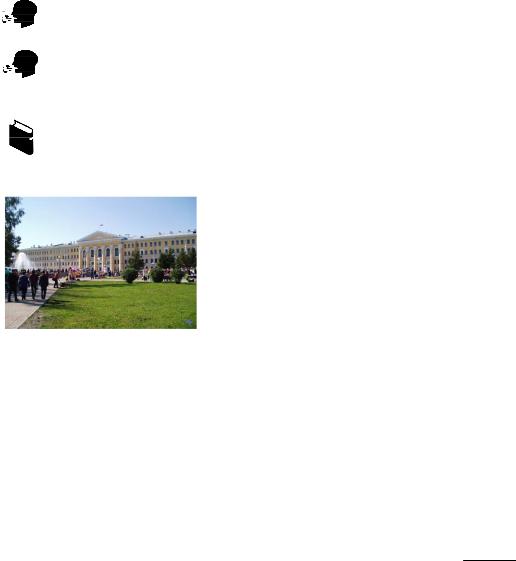
Speaker 2: I am a second-year student at the University of Business and Finance. I like studying here a lot. All the teachers are friendly and helpful.
Speaker 3: Yes, I am. Now I am a student of a technical university but the teacher of English told me that I am good at languages, so I would like to get language education as the second one.
Speaker 4: No, I am not. I don’t have satisfactory marks and I get a monthly grant. My parents also help me a lot so it’s not necessary for me to start working. Besides, I have no much free time. No, I am not trying to earn any money.
Speaker 5: Well, I am not sure exactly. Last term we had three exams and six credit tests. Next term we are having five exams and four credit tests.
3.10. Work in pairs. Ask and answer questions from exercise 3.9.
3.11. Report your partner’s answers to the class.
3.12. Read the text.
TOMSK STATE UNIVERSITY OF CONTROL SYSTEMS
AND RADIOELECTRONICS
Tomsk State University of Control Systems and
Radioelectronics was founded in 1962.
At the present time TUSUR is one of the leading higher educational establishments in Russia. The university has three departments: a day-time, an evening and a correspondence ones. In 1998, the Center of Distant Education was founded which is one of the biggest and equipped with the most
modern computers and other devices. It gives the opportunity to get the higher education without leaving native towns and cities for more than 8,000 students all over Russia.
There are seven faculties at the day-time department: the Radio-Design, Radio-Engineering, Electronic-Engineering, Computer Systems, and Automated Control Systems, Economic and Humanitarian ones. The university is staffed with highly qualified teachers. Many of them are Doctors of Science. The teachers of the university prepare specialists and engineers in 54 specialties in the field of radioengineering, programming, information security, radioelectronics, automated control systems, information technologies, economics and social work.
53

In 2006, TUSUR won the contest among the universities of higher professional education in accordance with the national project “Education” and since that the innovative program has been carrying out in scientific and research spheres of TUSUR.
One of the directions in scientific and research development is the exchange of students and cooperation with the leading universities of the USA, Germany, France, the Netherlands and Great Britain.
The students of the university are trained in the following specialties: construction and production of radio devices, radioengineering, radioelectronic devices, industrial electronics, physical electronics, automated control systems, automated design systems, social work and management. There are also scientific students’ societies where students are engaged in independent research work and design. The specialties which the students of TUSUR get are required
in different international enterprises, firms and companies.
Tomsk State University of Control Systems and Radioelectronics is developing rapidly. The students of the university have all the opportunities for high-quality training and they do their best in order to become good specialists.
3.13.Read the text again and answer the following questions.
1.When was TUSUR founded?
2.How many departments are there in TUSUR?
3.When was the Center of Distant Education founded?
4.What specialties are the students of the university trained in?
5.When did the university win the contest in accordance with the national program “Education”?
6.How many faculties are there at the university? Give their names.
7.What faculty do you study at?
8.What is your future specialty?
9.Which countries does the university cooperate with?
10.How many students are trained in the Center of Distant Education?
3.14. Imagine you are talking to a foreign student. What would you tell him about the university you are studying at the moment?
54

3.15.Read the following international words and notice their pronunciation.
faculty |
examination |
computer |
design |
cooperate |
specialty |
distant |
department |
opportunity |
automated |
radioelectronics |
telecommunication |
system |
control |
industrial |
direction |
specialist |
radioengineering |
Table 3.3
Present Simple and Present Progressive Tenses
Present Simple Tense |
Present Progressive Tense |
||
|
|
|
|
I always have lunch with my |
I am having lunch with his |
||
class-mates at 12.30 in the afternoon. |
class-mates now. |
||
We do not (don’t) usually do our |
We are not (aren’t) doing our |
||
homework at weekends. |
homework today because it is |
||
|
Saturday. |
||
Do they go to the gym every day? |
Are they going to the gym at the |
||
|
moment? |
||
– Yes, they do. |
– Yes, they are. |
||
– No, they don’t. |
– No, they aren’t. |
||
Where do you usually go after |
Where are you going? |
||
lessons? |
– I am going to the library. |
||
– I usually go to the library. |
|
|
|
|
|
|
|
Permanent action (state) |
Temporary action (state) |
||
|
|
|
|
He works as a university teacher. |
He is working in a bank at the |
|
|
|
moment. |
||
She doesn’t live in London. She lives |
She is not (isn’t) living in London |
||
in Milan. |
now. She is living in Milan. |
||
Does she have many lessons every |
Is she having many lessons this |
||
week? |
week? |
||
– Yes, she does. |
– Yes, she is. |
||
– No, she doesn’t. |
– No, she isn’t. |
||
What does she like cooking? – She |
What is she cooking? – She is |
||
likes cooking meat dishes. |
cooking something delicious. |
||
|
|
|
|
|
|
|
|
55

time expressions |
time expressions |
|
|
always |
now |
never |
right now |
usually |
at the moment |
sometimes |
at present |
often |
today |
every day (week, month, year) |
tonight |
once a week (a month, a year) |
this week (month, year) |
twice a week (a month, a year) |
|
three times (a month, a year) |
|
|
|
3.16.Choose the correct variant.
1.We often borrow / are borrowing English films from the video club.
2.‘What’s that music?’ ‘My brother listen / is listening to his new CD of gothic music.’
3.British people are eating / eat a lot of Indian food.
4.Don’t make noise. My room-mates sleep / are sleeping after a hard day at the university.
5.John is helping / helps in the Greenfield café. He usually works / is working there in summer.
6.Do you wear / Are you wearing a uniform at your school?
7.Mary isn’t playing / doesn’t play tennis very well today.
8.Look at Alex in this photo. He wears / is wearing a very smart suit.
9.I don’t need an umbrella. It doesn’t rain / isn’t raining at the moment.
10.A lot of British students go / are going to Spain on holidays.
3.17.Complete the following sentences with the present simple or present progressive form of the verb in brackets, as in the model.
Model: – Martin … (not / usually / drive) to work.
–Martin does not usually drive to work.
–I … (have / lunch) with my parents at the moment.
–I am having lunch with my parents at the moment.
1.‘Where is Andrew?’ ‘I … (not / know).’
2.Sally is tired. She … (want) to go home now.
3.What time … (you / do) your homework?
4.Mark … (prepare) for Physics test in the laboratory at the moment.
56
